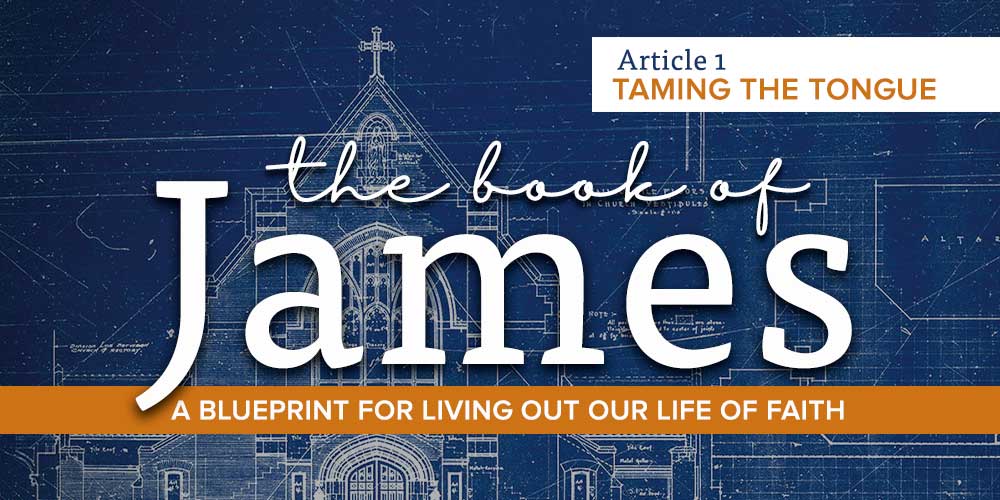 |
A blueprint for living out our life of faith
The gift of speech brings much joy. What if we had no tongue to help us say, “I love you”? What if there’d be no familiar voice on the cell phone? No first word from a child or grandchild to hear? Much sunshine would be lost if the gift of speech were gone.
Unfortunately, speech doesn’t always spread sunshine. At times it can fall like sleet and freeze the heart. James describes how the tongue is to be used in his blueprint for living our life of faith.
Tamed by Christ
God gave humans dominion over beasts and birds, serpents and sea creatures. Sin blighted this mastery, yet humans can control the animals around them. Sadly, they cannot master the tongue within them. The fall into sin altered our mastery over animals, but it completely canceled our control over our own tongue. Since the fall, a human’s tongue is a wild beast that cannot be broken or brought under control (cf. James 3:7,8).
A brief glance into the shadows of sin in Eden shows this fact. After the fall, Adam used his tongue to make an excuse to his Maker and an accusation against his wife. In our own lives, we have seen the shadow of sin in Eden. The loving, glorifying tongue has become “a restless evil, full of deadly poison” (3:8). Like some restless snake, it slithers around, striking without warning, poisoning with its venom. Humans can dominate animals, defy gravity, defeat distance, dive into the depths, but they can’t tame their tongue.
When it comes to tongue taming, humans are not only weak but helpless. Only the Savior can work such a tongue transformation, for it first involves a heart transplant. Only Jesus can “create [in us] a pure heart . . . and renew a steadfast spirit within [us]” (Psalm 51:10). Only when he has done this through Word and sacrament can the words of our mouth and the meditation of our heart even begin to be acceptable in his sight (cf. Psalm 19:14).
Trained for Christ
James presents matters just as they are in the world and even at times among believers when he says, “Out of the same mouth come praise and cursing. My brothers and sisters, this should not be” (3:10). What a Dr. Jekyll and Mr. Hyde our tongue can be at times. With it we bless God who has brought us to faith and restored his holy image in us. Yet with the same tongue we curse people whom God also wants to bring to faith and in whom he wants to restore that same sinless image.
If we have been guilty, we need to plead in penitence, “God, be merciful to me, a sinner.” He will hear and answer. He placed his own living Word of Love into a stable. That Word was pierced on a cross to cleanse us from the sins of the tongue. Through his gospel he will train our tongues, turning them from saying foul, hateful words that offend God and others to using gentle, kind words of peace and love, from cursing people to communicating to them the promises of love from our God.
Digging deeper
1. What does our heart have to do with the use of the tongue (Matthew 15:17-19; Matthew 12:33-35)?
Our sinful nature, inherited from sinful parents, is the cesspool from which our sinful thoughts, words, and deeds flow. The gospel changes us; it is God’s power (Romans 1:16). We have a new heart that desires to serve God and others. Our words then flow from that new heart, and we suppress the old sinful nature by the power of God’s love and forgiveness.
2. Why are Psalm 141:3 and Psalm 19:14 good prayers about our tongue?
Only God can work faith in us, giving us a “heart” that seeks to use our tongues to glorify his name and speak well of and to our fellow man.
The power to control our tongues and to live as Christians in this world comes from God. It is important to pray for God’s help in controlling our tongues. So these prayers are an important tool for our Christian life.
3. What connection does love for our fellow believers have with love for God (1 John 4:20)?
Believers show their love for God by loving their fellow human beings. Lack of love toward others is really a sign of lack of love for God.
This is an article in a continuing series on the book of James.
Author: Richard Lauersdorf
Volume 108, Number 7
Issue: July 2021
- Psalm 103: When you count your blessings
- Psalm 91: When God lifts you up on his lap
- Psalm 4: When you draw nearer to the end
- Psalm 42: When you ask, “Where is God when I’m hurting?”
- Psalm 32: When you need forgiveness
- Psalm 130: When rocks fall
- Bible study: Freedom in service
- What does this mean for me? Article 6
- Bible study: Spiritual gifts
- What does this mean for me? Article 5
- What does this mean for me? Article 4
- Bible study: Rejoice in your status!
- Bible study: Baptismal blessings
- What does this mean for me? Article 3
- What does this mean for me? Article 2
- Bible study: Gifts of tongues and miraculous healing
- What does this mean for me? Article 1
- Bible study: Jesus is everyone’s Savior
- Bible study: Love one another
- Bible study: Above all things!
- Bible study: The comfort of God’s providence
- The book of James: Waiting for Christ’s return
- Bible study: Precious grace
- The book of James: Active in using prayer
- Bible study: Rewards of grace
- The book of James: Active in showing love
- The book of James: Correctly evaluating riches
- Bible study: What’s going to happen on the Last Day?
- The book of James: Avoiding loveless judging
- Bible study: Interpretation practice
- The book of James: Taming the tongue
- Bible study: The Bible’s attributes
- Bible study: The importance of the family altar
- Bible study: God’s attitude is grace
- Bible study: The Bible’s account of Easter morning
- Bible study: Different types of sin
- Bible study: God’s inspiration
- Bible study: Giving God glory
- Bible study: Judge for yourself
- The book of James: Using the Word of Truth
- Bible study: The need for the Bible and worship
- Bible study: Citizens of two kingdoms
- The book of James: Active in good works
- The book of James: When battling temptation
- Bible study: God cares
- Bible study: God made the world
- The book of James: When facing trials
- Bible study: A loving God saved people from hell
- The book of James: A blueprint for living out our life of faith
- A Bible story just for me: Guilt
- Bible study: God provides victory over death!
- A Bible story just for me: Anxiety
- Bible study: God forgives and refuses to remember our sins
- A Bible story just for me: Grief
- Bible study: God helps those who cannot help themselves
- A Bible story just for me: Depression
- Bible study: God has not grown soft on sin
- Bible study: Only one path leads to God’s presence
- A Bible story just for me: Trauma
- A Bible story just for me
- Bible study: God wants me in heaven
- Bible study: The incarnation of our Lord






